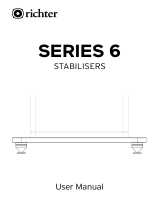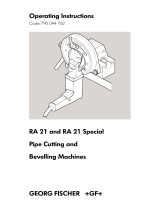Page is loading ...

Ultimate Mahler on vinyl with one of the best performances ever!
To celebrate Zubin Mehta's 80th birthday, Decca (Universal Music) proudly presents iconic Zubin Mehta albums in cooperation with The
Vienna Philharmonic Orchestra and Pro-Ject Audio Systems. A must-have for music fans of the analogue era back on heavy-weight vinyl.
Presented with original artwork, this recording has been carefully mastered from the original Decca analogue tapes at Abbey Road Stu-
dios.
This is probably Mehta's finest Mahler album ever. The first movement is very dramatic. Mehta opens with a very tense, brisk tempo.
Mehta never rushes, but never drags. The timpani is very well-defined, however not overpowering, throughout the movement, as well as
throughout the entire disc.The Andante is played very well. The phrasing is wonderful. The Scherzo starts out the best I have ever heard.
Two crisp, crystal clear Timpani strikes. Then the next 2 are softer, then the next 2 are even softer, which gives it an amazing affect.
Then to the Urlicht. Mehta's slower tempo just adds to the heartbreaking beauty. Add to that the gorgeous singing of Ileana Contrubas
and you have got a winning combonation. To the massive finale where Mehta really triumphs. The tempi are perfect. Mehta builds the
climaxes perfectly, never dragging. The brass play superbly! I heard some of the lower brass instruments in this movement that I didn't
even hear before in my other recordings. Very impressive. When the chorus enters, just listen to the bass singers! Spectacular. The enti-
re chorus sounds heaven-sent. Contrubas and Ludwig sing crystal clear and beautifully. The organ is heard very clearly. The combonati-
on of perfect tempi, magnificent signing and ultra-vituostic playing make the finale one of the most moving pieces of music you will ever
hear.
This recording has everything you could possibly ask for. Mehta's perfect tempi, great signing by Contrubas, Ludwig, and the Vienna
Staatsopernchor. The Vienna Philharmonic, particularly the brass, play just like the virtuostic ensemble that they are. Go and get it ASAP.
Update: JK / DZ Datum 25.04.2016
Vinyl DLP:
Gustav Mahler – Symphony N°2
The Vienna Philharmonic conducted by Zubin Mehta
Limited edition (2000 copies worldwide)
2x 180gr heavyweight virgin vinyl
Original gatefold cover
Audiophile sound experience
Remastered From Original Decca Analogue Tapes at
Abbey Road Studios
℗ 1975 The Decca Record Company Limited, London
In celebration of Zubin Mehtas 80th birthday
Includes voucher for free download of digital copy
Wiener Philharmooniker
Conductor: Zubin Mehta
LP 1
Side A:
1. Allegro maestoso. Mit durchaus ernstem und feierlichem Aus-
druck
2. Andante moderato. Sehr gemachlich
Side B:
3. Scherzo: In ruhig fliessender Bewegung
4. O Roschen rot! Der Mensch liegt in grosster Not!
LP 2
Side C:
5. Part 1: I'm Tempo Des Scherzo, Wild Herausfahrend
Side D:
5. Conclusion: Sehr Langsam Und Gedehnt
PRO-JECT AUDIO SYSTEMS
a division of AUDIO TUNING GmbH
1050 Wien, Margaretenstraße 98, Telefon: +43 1 5448580
SRP
39,90 €
Gustav Mahler
Product information
04. 2016

2
Wiener Philharmoniker (Vienna Philharmonic)
The Wiener Phjilharmoniker were founded in 1842, is an orchestra regularly considered one of the finest in the
world. The Vienna Philharmonic is based in the Musikverein in Vienna. Its members are selected from the or-
chestra of the Vienna State Opera. Selection involves a lengthy process, with each musician having to demonstrate
his or her capability for a minimum of three years' performing for the opera and ballet. After this probationary peri-
od, the musician may request from the Vienna Philharmonic board an application for a position in the orchestra.
In 1898, on 24 September, the orchestra elected Gustav Mahler. (On 30 May 1899, pro-Mahler and pro-Richter
factions had a "heated committee meeting"; matters were finally resolved in August when Richter wrote to his sup-
porters "gently refusing their offer".) Under Mahler's baton the Vienna Philharmonic played abroad for the first time
at the 1900 Paris World Exposition. While Mahler had strong supporters in the orchestra, he faced dissension from
other orchestral members (an unreconstructed pro-Richter faction plus an anti-Semitic one, according to Jens Mal-
te Fischer), criticism of his re-
touchings of Beethoven, and ar-
guments with the orchestra and
over new policies he imposed;
ultimately, "his working relations-
hip with the Vienna Philharmonic
continued to be fueled by resent-
ment and broke down completely
in November 1900". He resigned
on 1 April 1901, like Richter, citing
health concerns as a pretext, but
continuing to conduct actively
elsewhere (he remained director
of the associated Hofoper until
1907).
Update: JK / DZ Datum 25.04.2016
PRO-JECT AUDIO SYSTEMS
a division of AUDIO TUNING GmbH
1050 Wien, Margaretenstraße 98, Telefon: +43 1 5448580
Zubin Mehta was born was born into a Parsi family in Bombay (now Mumbai), India, the
son of Mehli and Tehmina Mehta. His father was a violinist and founding conductor of the
Bombay Symphony Orchestra, and also conducted the American Youth Symphony upon
moving to Los Angeles, CA. Mehta is an alumnus of St. Mary's School, Mumbai, and St.
Xavier's College, Mumbai. While in school, Mehta was taught to play the piano by Joseph
de Lima, who was his first piano teacher. Mehta initially intended to study medicine, but
eventually became a music student in Vienna at the age of 18, under Hans Swarowsky.
Also at the same academy along with Mehta were conductor Claudio Abbado and conduc-
tor–pianist Daniel Barenboim.
Mehta's first marriage was to Canadian soprano Carmen Lasky in 1958. They have a son,
Mervon, and a daughter, Zarina. In 1964, they divorced Two years after the divorce, Car-
men married Mehta's brother, Zarin Mehta, formerly the Executive Director of the New York
Philharmonic. In July 1969, Mehta married Nancy Kovack, an American former film and te-
levision actress. Mehta, a permanent resident of the United States, retains his Indian citizenship.
Conducting career
In 1958, Mehta made his conducting debut in Vienna. From this time on he performed and recorded with The Vienna
Philharmonic and created magic moments of musical mastership. In 1975,he recorded for Decca Mahlers recorded
symphony „The Resurrection“.
He won the International Conducting Competition in Liverpool and was appointed assistant conductor of the Royal
Liverpool Philharmonic. Mehta soon rose to the rank of chief conductor when he was made Music Director of the
Montreal Symphony Orchestra in 1960, a post he held until 1967. In 1961, he was named assistant conductor of the
Los Angeles Philharmonic; however, the orchestra's music director designate, Georg Solti, was not consulted on the
appointment, and subsequently resigned in protest; soon after, Mehta himself was named Music Director of the or-
chestra, and held the post from 1962 to 1978.
Product information
04. 2016
/



